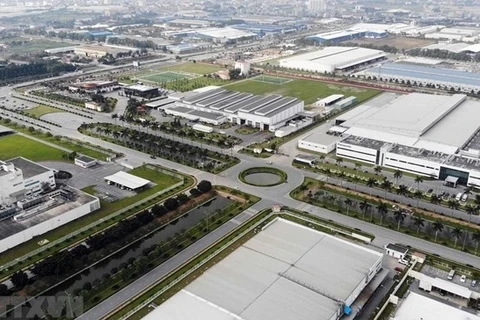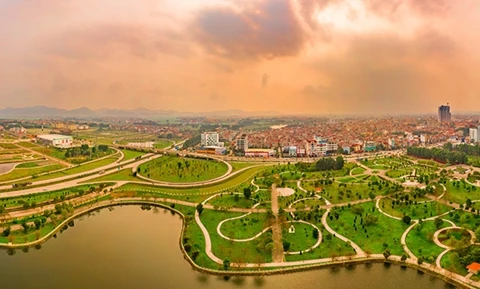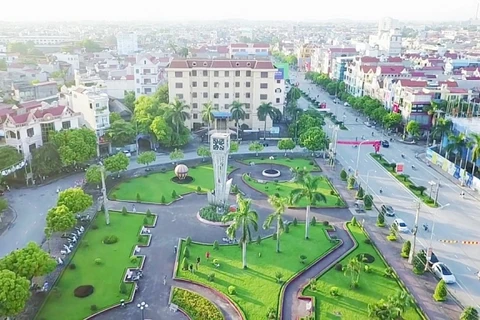 An automatic glove production line at Gloveland Vina Technology Co. Ltd located in Viet Yen district’s Viet Tien industrial cluster. (Photo:baobacgiang.com.vn)
An automatic glove production line at Gloveland Vina Technology Co. Ltd located in Viet Yen district’s Viet Tien industrial cluster. (Photo:baobacgiang.com.vn)Bac Giang (VNA) – The northern province of Bac Giang will adopt a series of solutions to accelerate the implementation of digital transformation, develop the digital economy and society in the locality in the future.
According to the Bac Giang provincial Party Committee, the realisation of digital transformation aims at providing benefits for people and businesses as well as promoting strong economic development of the province. It also helps improve the effectiveness of leadership at all levels and the management of local governments towards comprehensive and sustainable development of the province.
Bac Giang province is aiming at the target to provide 100 percent of public services at level 4 by the end of 2025 on various platforms, including mobile devices. Level 4 is the highest level of online public services, which allows users to fill and submit forms and pay fees online.
Over 95 percent of documents, applications at the provincial level will be handled online by then while the rates of documents and applications processed online at the district and communal level are expected to reach 85 percent and 65 percent, respectively.
By 2025, over 60 percent of inspection activities by state management agencies in the province will be carried out through the digital environment and the management agency's information system. The digital economy will account for about 25 percent of the province's gross regional domestic product (GRDP).
The province will have over 800 digital enterprises and 100 percent of households and all administrative units at communal level will have access to fibre optic broadband network by the same year. Two smart cities will be built in Bac Giang city and Viet Yen district. Of which, Bac Giang city will be among the top 15 cities in the country in terms of the smart city index.
To achieve the above-mentioned goals, Bac Giang will upgrade the provincial Data Integration Centre, promote the application of new technologies; develop high-quality broadband transmission network infrastructure and Internet of Things (IoT) connection.
Bac Giang will also invest in building platforms for digital transformation and seek cooperation with large corporations while conducting research and working towards the establishment of a concentrated information technology industry cluster of the province.
The development of digital society along with human resources to serve the digital transformation process will be promoted. People’s ability to interact with the digital government will be improved, and measures will be taken to ensure cyber security.
Priority will be given to digital transformation in eight areas with competitive advantages, including sectors that bring great value and have immediate effects on society such as health care, education, natural resources and environment, industry, agriculture, transportation and logistics sectors
According to the Department of Information and Communications of Bac Giang, the province is currently home to over 1,400 base transceiver stations (BTS) stations with 3G and 4G services covering the entire province. All communal-level People's Committees in the province have high-speed Internet connection.
There are more than 1.77 million mobile phone subscribers and over 1.25 million internet subscribers including fixed and mobile ones in the province. The revenue from telecommunications in Bac Giang topped 1.9 trillion VND (84 million USD) last year.
Vietnam is one of the pioneering countries in building a national digital transformation programme, with the three main pillars of digital government, digital economy, and digital society.
The Prime Minister issued Decision No 749/QD-TTg approving the national digital transformation programme by 2025 and vision towards 2030.
Under the programme, Vietnam expects to be among the top 50 countries in terms of e-government by 2030, while the digital economy is to contribute 30 percent of the national GDP.
Vietnam last year began its national digital transformation programme focused on a “digital government, digital economy and digital society”.
The country will adopt new technologies and models, completely overhaul the way the Government operates, update business operations, change the work style of citizens, and create a safe, secure and humane digital environment by 2030.
The digital economy is projected to produce 20 percent of the country’s GDP in the near future, with at least 10 percent of each economic sector part of the digital economy, while annual labour productivity will likely increase at least 7 percent./.




























